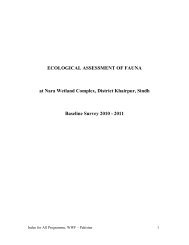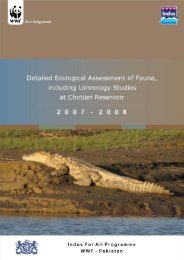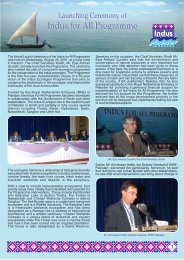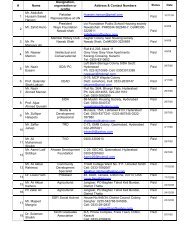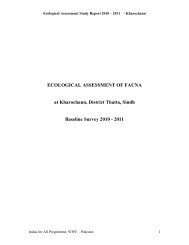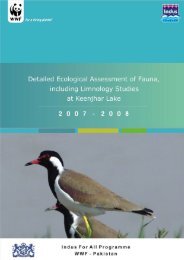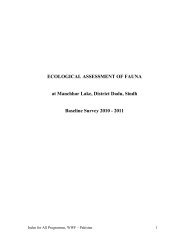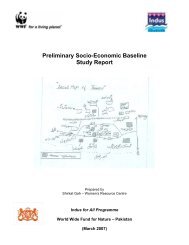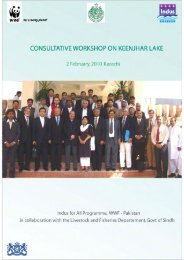Disclaimer note - WWF - Pakistan
Disclaimer note - WWF - Pakistan
Disclaimer note - WWF - Pakistan
You also want an ePaper? Increase the reach of your titles
YUMPU automatically turns print PDFs into web optimized ePapers that Google loves.
Detailed Ecological Assessment Report 2008 – Keti Bunder<br />
g. Assessment of impacts of environmental changes and human population<br />
pressure on potential mammalian species and their habitats. Associated<br />
mitigation steps are also to be suggested.<br />
h. Provide photographs, where possible, of the small mammal species.<br />
i. Compile a report on the consultancy addressing all the above-mentioned<br />
issues.<br />
j. To identify the key species of small mammals inhabiting the area.<br />
k. To identify impact of small mammals on the overall livelihood of the<br />
people.<br />
1.2.3 Reptiles and amphibians survey<br />
1.2.3.1 Rationale<br />
Amphibians and reptiles are very important animals among the vertebrates.<br />
Amphibians show the transition from aquatic to terrestrial life. Reptiles, the animals<br />
that invaded land, were the first fully terrestrial forms of life. Apart from their<br />
impressive evolutionary history, they beautifully demonstrate different concepts of<br />
physiological and behavioral adaptations to different climates, from tropical forests<br />
to hot deserts and marine to fresh -water. They do not have the ability to travel long<br />
distances like birds and mammals. In response to any local environmental changes<br />
they respond quickly and therefore may act as excellent biological indicators.<br />
Amphibians and reptiles are important components of any living system and play a<br />
key role in the interlocking web of nature. At one end they prey upon insects and<br />
other invertebrates and therefore regulate the population of these animals and on<br />
the other hand they are also a major source of food for other carnivore species<br />
(birds and mammals). Their position in the ecological niche is so vulnerable that the<br />
survival and collapse of the whole energy cycle depends upon the presence and<br />
absence of the amphibians and reptiles. The existence and sustainable use of this<br />
biological resource is therefore imperative around the study sites.<br />
Despite the fact that amphibian and reptiles are an important biological resource,<br />
very little attention has been paid to them, in <strong>Pakistan</strong>. The major hurdle<br />
presumably is the lack of expertise and awareness in this particular field.<br />
Moreover, our society in general and rural folk in particular is mostly repulsive<br />
and afraid of reptiles. The results of the present study will enable us to know<br />
about the natural wealth of all the Programme sites in terms of amphibians and<br />
reptiles. Furthermore, the status of all the species of amphibians and reptiles will<br />
be evaluated so that in any adverse circumstances the conservation strategies<br />
could be suggested.<br />
1.2.3.2 Objectives of the study:<br />
The study was envisaged to provide for the first time, a comprehensive ecological<br />
and systematic account of the amphibians and reptiles of the Programme sites<br />
and their buffer zones. The prime objectives of the study were to:<br />
a. Collect and review secondary data on the reptile and amphibian species<br />
of the study sites, using the available literature and local inhabitants.<br />
b. Collect data from the field on species occurrence, abundance and<br />
diversity in the study areas.<br />
c. Prepare a taxonomical checklist of all the species with their English and<br />
local names and their status in the study sites.<br />
d. Identify threatened amphibian and reptile species in the IFAP sites and<br />
recommend measures to improve the situation.<br />
<strong>WWF</strong> <strong>Pakistan</strong> – Indus for All Programme Page 10 of 188



